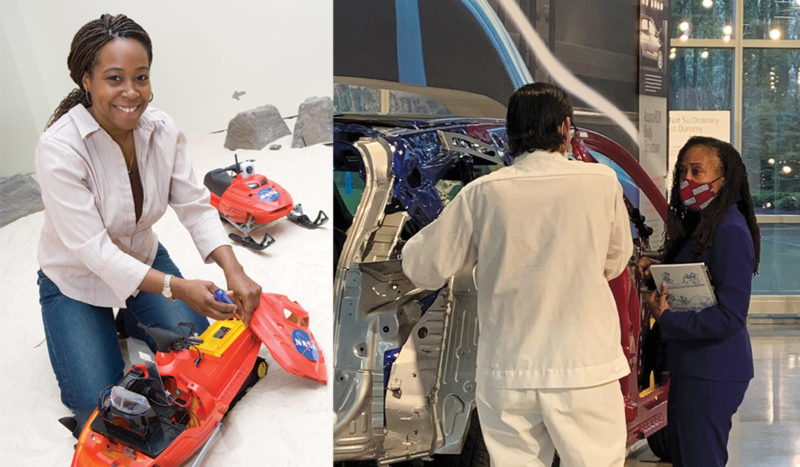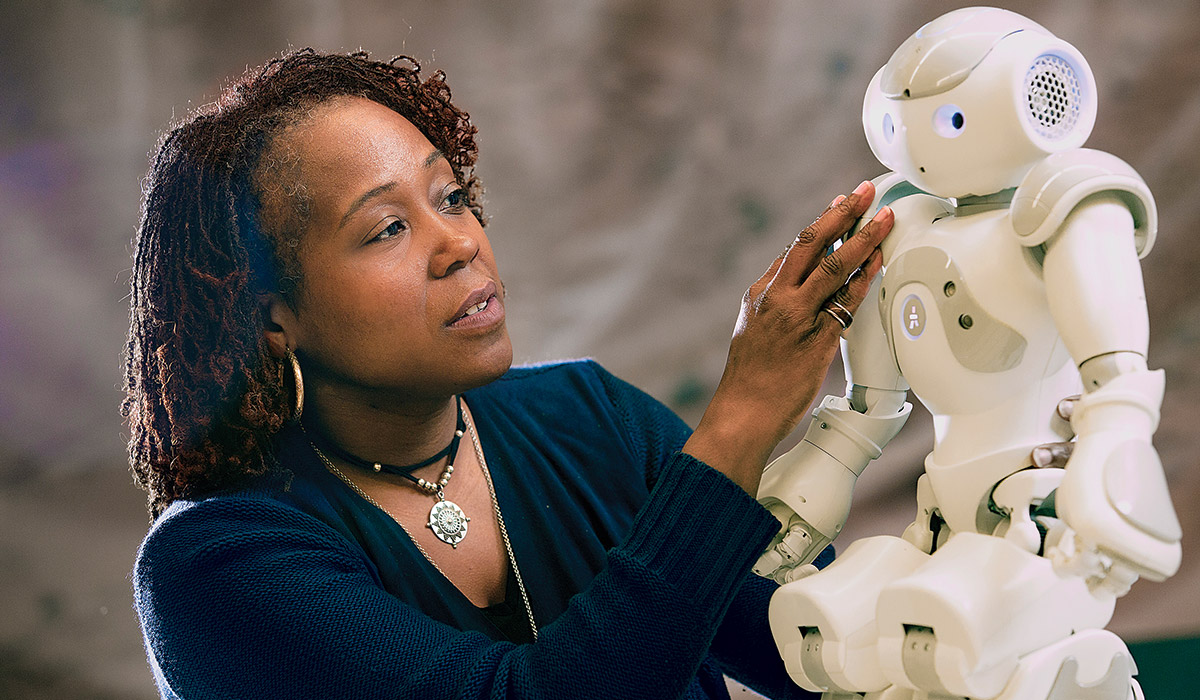Blazing Trails in Robotics, AI, and Leadership
One of acclaimed roboticist Ayanna Howard’s (MBA, 2005) fondest professional memories blends academics with adventure, the great outdoors, and some science fiction, too.
After leaving NASA—one of her early jobs was working there and helping develop artificial intelligence for the Mars rovers—Howard was involved in academic, science-driven robotics, designing robots that scientists could use to collect data. Her first project was with a climatologist, and they developed a suite of robotic snowmobiles called SnoMotes. The goal was to use these robots to collect data in the Arctic and Antarctic, places too dangerous for humans to visit.
The project required testing in the field, and Howard recalls what it was like being helicoptered to a remote glacier to see the robots in action. Few people can claim such an experience in their professional lives, and its specialness wasn’t lost on her.
“I was sitting on a glacier with a couple of colleagues and thought, ‘We’re the only humans here,’ ” she says. “How many people can say they’re sitting on a glacier with a robot they’ve created to enhance our understanding of the earth? It was a remarkable moment.”

Speak to anyone active in the field of robotics, and chances are good they’ve heard of Ayanna Howard. Over the course of her career, Howard has held positions at NASA’s Jet Propulsion Laboratory, served as program director of Georgia Tech’s first-in-the-nation multidisciplinary robotics PhD program, and flexed her entrepreneurial muscle as the founder of Zyrobotics, a company that creates educational technology products for children.
Howard’s also a graduate of the Drucker School of Management, and she has won accolades from several media outlets in her career. She has been named to the Forbes list of America’s Top 50 Women in Tech and recognized by Business Insider as one of the 23 most influential women engineers in the world. In addition, Vanity Fair singled her out for trailblazing impact not only in robotics but in the areas of diversity and bias, too.
How many people can say they’ve spent time on a glacier testing robots to help humanity?
Not too many, and Ayanna Howard is one of them.
Last fall, Howard once again broke new ground when she stepped into the role of dean of the College of Engineering at The Ohio State University, the first woman and the second African American ever to hold the position.
Despite these vaunted accomplishments, Howard’s mien is modest and approachable. When queried about the origins of her interest in engineering, for example, she offers a refreshingly simple explanation. “I’ve wanted to be a roboticist since I was in middle school—I was really into science fiction and science fantasy,” she says. Raised in Pasadena, she points to the fact that her father was an engineer and her mother a computer scientist, and that, she adds, “probably influenced me as well.”
As her memories of testing robots on the glacier suggest, Howard clearly enjoys seeing science in action, whatever the situation. As dean of the College of Engineering at Ohio State, she hopes to foster activity in a new way.
“I’ll still be doing research because I’ll always be a roboticist irrespective of titles,” she clarifies, “but I realized that in a leadership role, I could initiate change at scale. When I see the need to alter a situation, I can do something about it, rather than just talk.”
The size of the platform she was offered at Ohio State’s College of Engineering—with its combined undergraduate and graduate student body of just over 10,000—was particularly appealing, she adds. “If we’re doing it correctly here, we have the opportunity to be the gold standard for everyone else,” she enthuses.
Although Howard is early in her tenure, she is enthusiastic about the opportunities ahead. “Coming to Ohio State was the best decision ever. This institution is ready for change—people here want to do something different—and they have the resources to make it happen.”
Among Howard’s primary goals as dean will be to increase access and equity in education for under-represented individuals, from women and minorities to first-generation students.
‘Change is risky,’ Howard says, but getting people to think differently is worth the risk.
This is hardly a new interest or undertaking for her. Entering a field in which there have been few female roboticists—and even fewer who are women of color—has taught her many lessons that have always influenced her work. In 2017, for instance, she published the paper, “The Ugly Truth About Ourselves and Our Robot Creations: The Problem of Bias and Social Inequality,” in The Science and Engineering Ethics Journal. Her point in that paper was clear: Robots and AI are the products of their creators, and whatever societal or cultural biases have affected them will affect their robotic creations, too.
Whether offering a provocative argument to her peers or leading a college of engineering, Howard acknowledges that calling for a new way of looking at things involves risk.
“Change is always risky, but I love tackling questions like, ‘How do I get people to think differently?’ and ‘How do I change the culture?’ It’s fun.”
Howard is confident that she possesses the leadership skills to get the job done, in no small part due to the knowledge she gained as a student at the Drucker School of Management.
“I decided to pursue my MBA while working in project management at NASA,” she explains. “As an individual contributor, I always received top marks, but as a supervisor, I was falling short. I realized that I needed to educate myself on how to lead in the best way possible.”
Howard chose Drucker for its non-traditional approach.
“I was inspired by the school’s philosophy and multidisciplinary course offerings,” she recalls. “I remember seeing a course on creativity and working with different kinds of people, which really appealed to me, and Jeremy Hunter’s course on mindfulness sounded fascinating.”
Howard was already heavily immersed in her robotics research and development when she decided to study at the Drucker School. Still, she doesn’t regret the extra time and effort it required. The holistic approach to management she gained there is something she still applies today.
“Pursuing my MBA at Drucker was totally worth it,” she says. “I learned about many things—from finance to accounting to marketing—that I never dreamed would be of value to me in engineering leadership roles. But they have all proved helpful.”
Lori Ferguson is a freelance writer whose work has appeared in several higher education and consumer publications.
